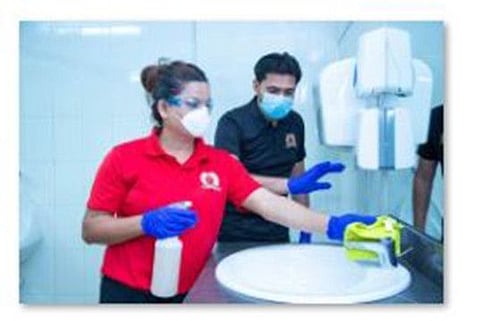Coronavirus threat: How safe are public toilets in the UAE?
A look at how these facilities are maintained as business, leisure activities reopen

Dubai: As offices, malls, airports and other public spaces in Dubai reopen, one uneasy question that is doing the rounds among residents is whether public toilets are safe to use amid the global pandemic.
Possible contamination coupled with poor hygiene habits can potentially make public toilets risky, but facilities management services and healthcare experts said stepped up protocols to ensure the highest levels of disinfection and cleanliness as stipulated by the authorities ensure that public bathrooms are safe in the UAE.
Markus Oberlin, CEO, Farnek, a facilities management service for leading malls, airports, banks, leisure and entertainment venues, telecom suppliers, residential and commercial buildings in the UAE, told Gulf News, “Public bathrooms are at a higher risk area of contamination and have numerous high touch surfaces: taps, paper towel dispensers, doorknobs and of course toilet handles. It is therefore imperative to ensure a high cleaning and disinfectant standard and monitor washroom usage, consumable levels such as soap solutions, paper towels and toilet rolls.”
He said Farnek has adapted new international standards in line with the Global Biorisk Advisory Council requirements, which is based on a detailed step-by-step process on how to ensure that the risk of contamination is reduced in a washroom.

Users’ hygiene matters
To a large extent, a toilet’s safety is determined by the hygiene maintained by its users.
As Dr Shilpa Murthy, General Practitioner, Aster Clinic – Arabian Ranches, said, there are many common mistakes that people make which reflect poor hygiene and in turn can pose a health risk in a toilet.

“Sitting on the toilet seats for too long, flushing with the toilet lids up, leaving the toilet without flushing, using cell phones inside, not washing hands long enough, needlessly touching surfaces … these are among the mistakes that people make, which can prove harmful, during COVID-19 or even non-COVOD-19 times,” she said.
Such habits notwithstanding, facilities management companies said their stepped up protocols ensure public toilets are safe to use.
Alternate cubicles, wash basins closed
Parris Ullrich, Head – Facilities Management at Transguard, which also caters to the facilities management requirements at major shopping malls, banks and tourist destinations in the UAE, said, “We ensure that High Touch Point cleaning is done every 10-15 minutes, which disinfects doorknobs, handles and dispensers. Where possible, we’ve installed automatic paper towel and soap dispensers. Regular cleaning and disinfecting of fan coil units and fresh air handling units filters is done and we’ve installed hand sanitiser dispensers at the entrance to all washrooms.”
Ullrich said alternate cubicles, wash basins and urinals have also been closed to maintain social distancing. “We’ve increased sanitation frequency after every customer usage. Seating areas in washrooms have also been closed, and the sofas and tables removed. We’ve added social distancing and COVID-19 awareness stickers in all the washrooms. Drinking water dispensers are closed as a safety measure and TP tests are conducted daily to measure the hygiene level after cleaning.”
First-of-its-kind digital monitoring
According to Oberlin of Farnek, disinfection is done throughout the day, as well daily deep cleaning and disinfections out of operation hours, which covers inclusive drain lines and areas that are difficult to reach during operating hours.
“Farnek has launched the Middle East’s first digitally monitored washroom via the use of innovative technologies, IoT sensors, machine learning, AI and cloud architecture. Utilising this technology, we are able to detect and identify peak times, monitor safety and determine when a cleaner is required – crucial during these times,” said Oberlin.
He said cleaners are also trained on new processes which have been adopted. They include social distancing measures, how to interact with customers in the washrooms and what to prioritise once a washroom has been used to quickly disinfect the area.
The experts said it is important to follow government regulations and directives when it comes to wearing masks and gloves and maintaining social distancing even in a public bathroom.
Tips to stay safe while in a public bathroom
Dr Murthy Of Aster makes the following recommendations while using a public toilet:
• Keep the lids closed after use
• Don’t eat or drink in the toilet
• Keep cell phones in your pocket or in your bag
• Keep your eye on your watch and focus on the task, instead of scrolling through the social media and making the next person wait
• Wash hands thoroughly - dabbling your hands with little liquid soap and running them under a teaspoon of water isn’t enough. You need to wash for at least 20 seconds
• Use tissue paper while opening the door knob, flushing the toilet and make sure you use the dustbin to dispose the same. Do not flush chewing gums and wet tissues which would definitely clog the toilets
• Clean up yourself and everything around you and make it easier for the next person
• Read the signs and boards displayed and follow the golden rule of public bathroom usage










